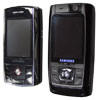![]()
![]()
![]()
![]()
![]()

Review GSM phone Samsung D800/D820 |
 The
company of Samsung is a rare manufacturer who may presume
parallel development of similar products based on various
hardware and software platforms. The history of mobile phones by
Samsung began with the small projects, but the following
expansion of R&D complex and its partial transformation in Suwon
with simultaneous start of other technological platform have
made the business; various devices similar by their design but
different by functions have appeared among the product range.
Models that support sound record during conversation and models
without such feature can serve as an example of such
heterogeneity. The presence of such a function can be explained
by the hardware and place of development (Gumi or Suwon). Last
year the decision was made to result all models to uniform type
of the menu, monotonous construction of submenus and various
functions. But due to the large variety of models and lack of
time, it occurs not always and not as fast as it is desired. And
a similar situation happened with Samsung D800 and Samsung D820. The
company of Samsung is a rare manufacturer who may presume
parallel development of similar products based on various
hardware and software platforms. The history of mobile phones by
Samsung began with the small projects, but the following
expansion of R&D complex and its partial transformation in Suwon
with simultaneous start of other technological platform have
made the business; various devices similar by their design but
different by functions have appeared among the product range.
Models that support sound record during conversation and models
without such feature can serve as an example of such
heterogeneity. The presence of such a function can be explained
by the hardware and place of development (Gumi or Suwon). Last
year the decision was made to result all models to uniform type
of the menu, monotonous construction of submenus and various
functions. But due to the large variety of models and lack of
time, it occurs not always and not as fast as it is desired. And
a similar situation happened with Samsung D800 and Samsung D820.Models were conceived as the symmetric answer to the appearance of Motorola RAZR V3 and products based on it, in particular metal slider (the first quarter of 2006). Work on the devices design and their features began simultaneously in both R&D centers. There were no any preconditions - the device should be thin, related to the fashion segment and its functionality should not exceed Samsung D600 (the leader). This translated both models automatically in the category of semi flagman; in internal Samsung's classification this term is applied for models with high potential in the market but not having maximal functionality for their segments. In one month of work on projects it became clear that the final result will be similar by all features, and models should be staggered in order to create various positioning. It was decided to make one device little bit smaller than other, but to refuse of using flash cards in it. At the same time the design of the younger model was made to be more brightly in order it served for the target audience as much as possible. In the senior model the functionality acts as a ginger which will involve consumers, the design is secondary. Lyrical digression. At first I decided to write separate materials on these two devices as there is a small difference between them in spite of the fact that the concurrence of functions is approximately 70 percents and does not allow naming them completely various. But finally the buyer will try to choose one of these two devices if the choice will be among sliders of the given segment. Therefore it looks logical to combine them in one material. The text will contain special marks when some of the functions will differ for one of the models. The appearance of models will be discussed in details while comparing. Design, size, configuration The D800 imperceptibly reminds sliders by Nokia, earlier it was Nokia 8810 and today it is Nokia 8800. Similarity is present only by sensations and it will not be seen at direct comparison. From some angels of view D800 was considered to be Nokia 8800 by many people due to the insignificant slider's size and the presence of a chrome plated fringing. This element of design is evident and shades the device. It is unusual for Samsung to use other materials than monophonic plastic; the company starts this practice only at the end of this year or at the beginning of the next year. The fringing blinks at bright illumination and, taking into account the marking-off surface which always has greasy spots, it creates the unpleasant impression. At a constant use of D800 it will be necessary to reconcile to a dirt on the screen or to carry it in a pocket of jeans (it's a variant of self-cleaning of surfaces). Use of glossy plastic looks advantageously in a show-window, but in daily life it is not so good. This type of plastic is steady to fretting, but scratches still appear on it, especially at the top part of the screen. Fretting is appreciable at attentive studying of the device, in usual conditions you will not see such problem (it is a question of durability of the device's appearance; in my opinion, it will make about one year at daily usage). Certainly, there is always a probability, that the user will be accurate and mentioned reasons will be senseless. |
![]()
|
© Copyright
colloquiality.net All rights reserved.
|
![]()